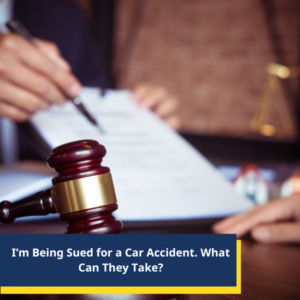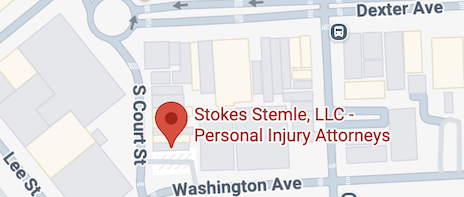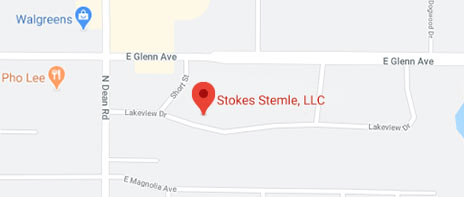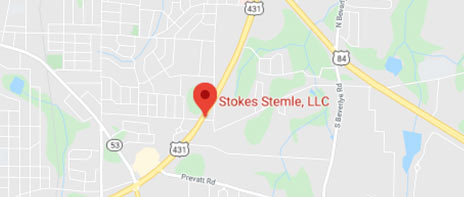A Guide to Protecting Your Assets in Alabama When Someone Sues You For a Car Accident

Do you know what could happen to your assets if someone sues you for a car accident in Alabama? State and federal laws protect certain assets, but you could still lose property if the court rules against you. A car accident lawyer from Stokes Stemle can review your case, explain your legal options, and help you protect your assets. Contact us today for a free consultation to learn how we can advocate for your rights and shield your property from creditors.

Understanding Liability in a Car Accident Lawsuit
If you are sued after a car accident, it is crucial to understand precisely what the lawsuit entails. The plaintiff (the person suing you) likely hired a personal injury attorney to represent them in recovering damages for their losses, a legal term for monetary compensation for injuries. These damages can include money for medical bills, lost wages, pain and suffering, and other accident-related losses.
The plaintiff’s attorney will gather evidence to attempt to prove that you were at fault for the accident and that their client endured injuries and harm as a result. If the case goes to trial, they will present this evidence to a judge or jury and ask them to award a settlement to cover the plaintiff’s losses.
How is Negligence Determined?
Negligence is the most common basis for liability in a car accident claim. To demonstrate negligence, the plaintiff must prove that you failed to drive with reasonable care and that your actions caused their injuries. However, Alabama follows a pure contributory negligence rule, which means that if the plaintiff shares any fault for the accident, they are not entitled to any compensation.
Some cases do not require proof of negligence to establish liability. For example, the plaintiff could demonstrate strict liability by proving that you were engaging in unreasonably dangerous activities when the crash happened, such as unauthorized street racing. They could also sue you based on negligence per se, which is a legal theory that says you are automatically considered negligent if you cause harm while violating public safety laws. These include reckless driving and drunk driving laws.
If a court finds you liable, you might have to pay damages (money) for the plaintiff’s medical bills, lost wages, and other losses. Your auto insurance could cover some or all of these costs, but if the damages exceed your policy limits, you might need to make up the difference with your personal assets.
What Assets Are at Risk in a Car Wreck Lawsuit?
If you lose a car accident lawsuit in Alabama and the damages exceed your insurance coverage, your personal assets could be at risk. The court might allow the plaintiff, now a judgment creditor, to collect the remaining balance by targeting certain assets you own. Alabama law protects some property through exemptions, but the following non-exempt assets could be subject to collection efforts:
- Bank Accounts – A judgment creditor might seek a court order to freeze or withdraw a limited amount of funds from your bank account (Ala. Code § 6-10-7). If the court grants a bank levy, the creditor could take money directly from your checking or savings account.
- Wages – A creditor could garnish a portion of your wages if you owe money from a lawsuit judgment (Ala. Code § 6-6-390). Alabama law limits how much a creditor can take, but a percentage of each paycheck could go toward paying the debt.
- Real Estate – If you own real estate, a creditor might place a lien on your property (Ala. Code § 6-9-210). State law allows a homestead exemption, which protects a portion of your primary residence from creditors, but investment properties or second homes are not protected.
- Vehicles – A judgment creditor might try to seize a vehicle you own if it has enough value to satisfy the debt. Alabama law protects a limited amount of equity in a personal vehicle, but if the car is worth more than the exempt amount (Ala. Code § 6-10-6), the creditor could take it.
- Personal Property – A creditor could target your valuable personal property, such as jewelry, electronics, or collectibles. Alabama law allows certain exemptions for household goods, but high-value items that exceed the exemption limit might be at risk.
- Business Interests – If you own a small business, the plaintiff might try to collect against your ownership interest (Ala. Code § 10A-5A-5.03). If you operate a sole proprietorship, your business assets might be at risk because they are not legally separate from your personal assets.
- Investment Accounts – A creditor might try to collect money from non-retirement investment accounts, such as stocks, bonds, or mutual funds. Alabama law shields certain retirement accounts, but taxable investment accounts do not receive the same level of protection.
What Can’t They Take?
If a court rules against you in a car accident lawsuit, the judgment creditor might try to collect the amount you owe them by going after your assets. However, Alabama law protects certain property from collection, meaning the creditor cannot take or force you to sell these assets to satisfy the judgment. These exempt assets include:
- Your Primary Residence – Alabama law protects a certain amount of equity in your primary home under the homestead exemption (Ala. Code § 6-10-2). If your equity falls within this limit, the creditor cannot force you to sell the property to pay the judgment.
- Certain Wages – Alabama law limits how much of your paycheck a creditor can garnish. Under state and federal law, a creditor can’t take more than 25 percent of your disposable earnings or however much of your income exceeds 30 times the federal minimum wage, whichever is lower.
- Retirement Accounts – Most retirement accounts, including 401(k) plans, pensions, and IRAs, receive strong protection from judgment creditors under federal and state laws. Creditors cannot seize these funds to satisfy a lawsuit judgment.
- Personal Property Up to the Exemption Limit – Alabama law protects personal property up to a certain dollar value limit. This includes household goods, furniture, clothing, and electronics.
- Tools of the Trade – If you own tools, equipment, or other items necessary for your job, Alabama law allows you to protect them up to a certain value (Ala. Code § 6-10-126). The exact exemption amount depends on the type of tools and their use in your profession.
- Public Benefits – Creditors cannot take money from certain government benefits, including Social Security, disability payments, unemployment benefits, and veterans’ benefits (Ala. Code § 38-4-8). These funds remain protected unless you combine them with other funds.
- Life Insurance Proceeds – If you are the beneficiary of a life insurance policy, Alabama law protects certain insurance proceeds from creditors (Ala. Code § 27-14-29). However, specific rules apply, and protection levels depend on the policy terms and how the funds are structured.
Steps to Protect Yourself
If someone sues you after a car accident in Alabama, you need to act quickly to protect yourself and your assets. Ignoring the lawsuit could result in a default judgment, which could allow the plaintiff to collect damages without your input.
First, you should notify your auto insurance company about the car crash immediately. Your policy might cover the lawsuit, and your insurer could provide a lawyer to defend you. Failing to report the claim on time, however, could lead to a denial of coverage.
Next, you should take stock of your assets and compare them to Alabama’s exemption laws. Some assets, like your primary residence and retirement accounts, might be protected from collection. Understanding what creditors can and cannot take will help you make informed decisions.
You should also avoid moving or hiding assets to prevent collection. Transferring property to friends or family could be considered fraudulent and lead to further legal consequences.
Be sure to respond to all court documents and keep all deadlines in mind. If you receive a summons or complaint, file a timely response to avoid an automatic loss.
Finally, seek legal representation. A lawyer can help you negotiate a car accident settlement, challenge the lawsuit, and protect your exempt property. Even if your insurer provides a lawyer, it’s a smart idea to consult a separate attorney for asset protection advice.
Preventing Future Financial Risk
If you want to reduce the financial risks of a car accident lawsuit, you can take steps now to protect yourself. Proper planning can help you avoid losing personal assets if someone sues you in the future.
Start by reviewing your auto insurance policy to make sure you have enough liability coverage. Alabama requires minimum coverage amounts, but higher limits will provide better protection. Consider adding umbrella insurance, which can cover damages beyond your auto policy’s limits.
Second, consider keeping certain assets in protected accounts. Alabama law exempts retirement accounts, certain life insurance proceeds, and some personal property from collection. Keeping more of your savings in these protected accounts can reduce your exposure if someone sues you.
Third, limit co-ownership of property if you want to protect specific assets. If you own real estate or bank accounts jointly with someone else, a creditor might try to collect from those assets.
Fourth, drive carefully and follow traffic laws. Avoiding accidents reduces your chances of being sued. If you receive a ticket for reckless or negligent driving, that violation could be used as evidence against you.
Fifth, consult a lawyer if you have significant assets. An attorney can help you structure your finances now in a way that minimizes the risk of serious financial consequences later.
Contact Our Alabama Car Accident Attorneys to Learn More
A car accident lawsuit can put your finances at risk, but there are steps you can take to protect yourself. Stokes Stemle, LLC can explain your rights and help you figure out what to do next. Contact us today for a free consultation to get the answers you need and start securing your future.

















